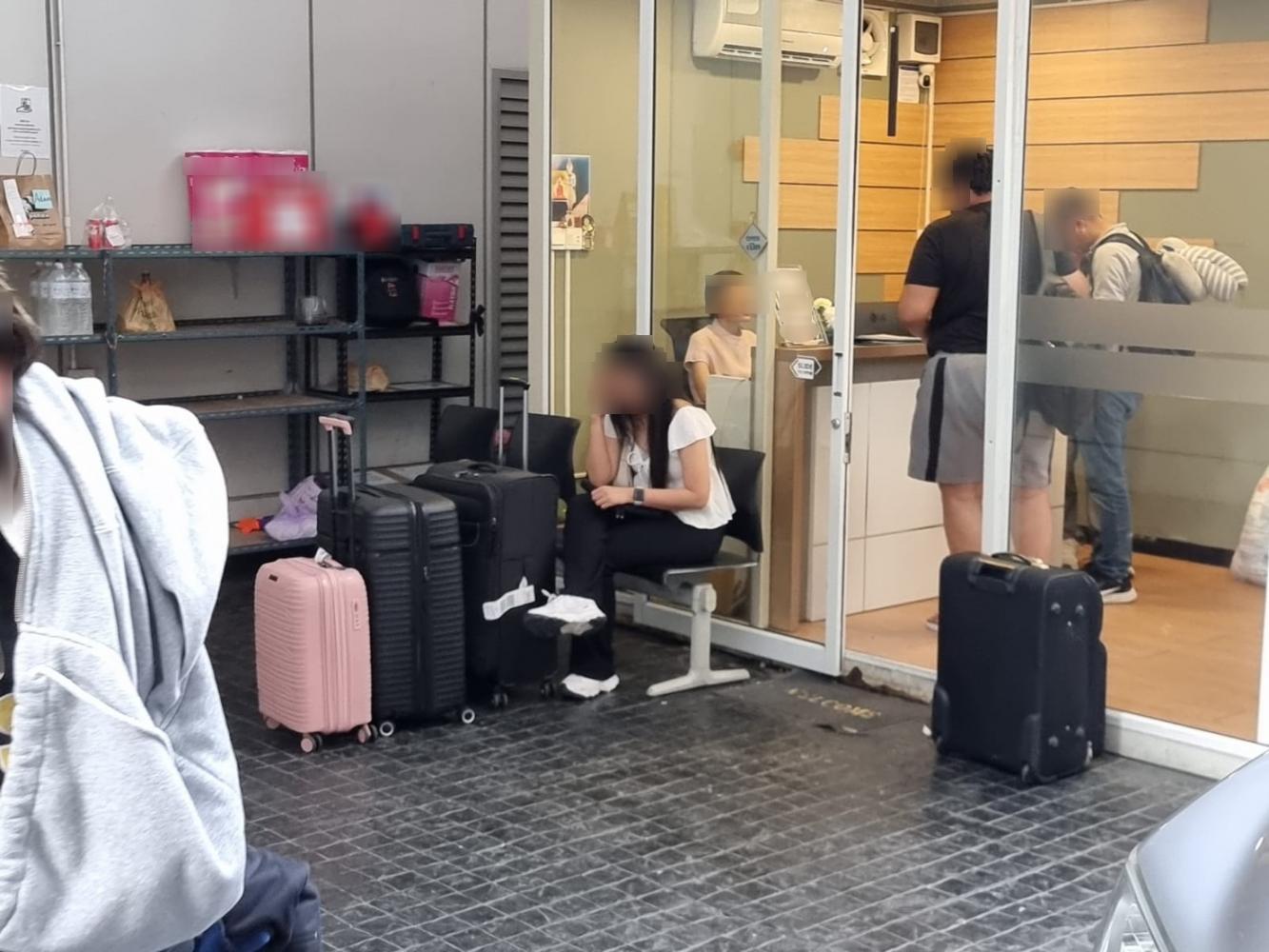Illegal Daily Condo Rentals Persist in Bangkok as Sukhumvit 11 Building Evades Inspections by Renaming
A Sukhumvit 11 condo in Bangkok continues to draw a steady flow of daily guests despite ongoing enforcement efforts to curb illegal daily rentals in condo buildings. A property developed by a SET-listed company has reportedly dodged official scrutiny by changing its name, while a foreign resident who owns a unit indicates the issue remains unresolved even after recognition by the Bangkok Metropolitan Administration. The Wattana district office has pressed the juristic person to share information about owners renting units daily to fuel legal proceedings, yet more than half of the building’s 450 units are still believed to be rented out illegally through online platforms. Since February, a new management firm has taken over the juristic person’s responsibilities, and despite resident complaints, concrete enforcement action has yet to materialize. This report delves into the ongoing illegal daily rental activity at Sukhumvit 11, the local administrative response, how operators are attempting to evade oversight, and the broader implications for hospitality, real estate management, and provincial enforcement in the region.
Ongoing illegal daily rentals at Sukhumvit 11: scope, actors, and tactics
The Sukhumvit 11 condo cluster in Bangkok has become a focal point in the city’s broader struggle against illicit daily rentals operating within the condo sector. The situation is characterized by a persistent flow of short-stay guests, facilitated through online travel platforms, with a substantial portion of the building’s accommodation reportedly rented on a daily basis without proper adherence to condo rules and local regulations. A foreign resident who owns a unit in the building provided a firsthand account indicating that the problem remains unresolved, despite formal recognition by the Bangkok Metropolitan Administration (BMA). This claim underscores a disconnect that can occur between administrative acknowledgment and on-the-ground compliance, particularly in a market where rapid turnover and high demand for short-term stays intersect with the governance of multi-owner properties.
Details emerging from the source depict a pattern of activity designed to enable daily occupancy while circumventing oversight. Guests receiving a key card to activate the elevator and access their rooms—without automatic inclusion of access to shared facilities such as the swimming pool or the gym—signal a bifurcated utilization of the property. In practice, this arrangement implies that the juristic person and property developers are aware of, or at least complicit in, a scheme that limits guest access to certain areas, effectively compartmentalizing the use of the building to satisfy daily rental arrangements while minimizing checks on common facilities and overall building management. The existence of such a model raises questions about how leases are structured, who is listed as the owner or operator in daily rental transactions, and what steps are being taken to align with condo regulations, safety standards, and visitor management protocols.
Compounding the complexity, the property’s branding and listing identity on online platforms have come under the spotlight. An agent reportedly changed the condo’s name on online booking platforms to another designation in an attempt to dodge inspections and scrutiny. This tactic illustrates the ongoing challenge for authorities and property managers in monitoring and enforcing compliance when operators can alter the publicly visible identity of a property to avoid detection or penalties. The ability to rebrand or rename a building for the purposes of short-term rental advertising weakens the linkage between the listing, the property’s legal status, and the management company responsible for the building’s governance.
In this environment, enforcement faces several practical hurdles. While the problem is evident in Bangkok, the experience differs from Pattaya, where changes in building management have led to a sharp decline in daily rentals. Observers note that the Bangkok case reflects a more fragmented market where ownership structures, management arrangements, and platform listings can obscure responsibility and complicate enforcement, particularly when a large proportion of units are owned by individuals who participate in rental activity rather than hotel operators.
Local government response: recognition, summons, and a challenging path to compliance
The Bangkok administration appears to have taken formal steps to document and address the issue within Sukhumvit 11. The Wattana district office, acting at a local level, submitted a formal communication to the condo’s juristic person in January, urging them to disclose information regarding owners who rent out units on a daily basis. The purpose of this request is to facilitate the legal process and enable authorities to identify responsible parties and implement appropriate measures to curb illegal activity. The act of requesting information suggests a strategy aimed at building a clearer evidentiary basis for enforcement, highlighting the role of juristic persons and property management bodies as key interlocutors in the crackdown on illicit daily rentals.
Despite these administrative actions, the status of enforcement remains unresolved in the eyes of residents and owners alike. The juristic person, now operated by a new management firm that assumed duties in February, has received complaints from residents about ongoing daily rental activity. Yet, according to residents and sources close to the matter, no decisive action has been taken to remove or penalize operators, revoke permits, or impose penalties that could deter the illicit practice. This gap between formal requests for information and concrete enforcement outcomes underlines a broader challenge: balancing regulatory intent with the practicalities of monitoring multi-owner properties, navigating complex ownership structures, and ensuring that appropriate penalties are applied in a timely manner.
In the Bangkok context, authorities rely on a combination of condo governance rules, local ordinances, and national frameworks governing short-term rentals to assert authority over illegal daily rentals. The case of Sukhumvit 11 is emblematic of a broader tension in which the regulatory apparatus is trying to keep pace with sophisticated rental operations that leverage online platforms, cross-border ownership, and the flexibility of multi-unit developments. The absence of rapid, visible enforcement actions can undermine public confidence in the crackdown, while the persistence of illegal daily rentals contributes to competitive distortions that affect legitimate property owners, tenants, and neighboring residents alike.
Platform evasion and operational details: how illicit rentals are managed in practice
A critical element of the Sukhumvit 11 scenario involves the operational modalities of illicit daily rentals and the strategies employed to evade scrutiny. The reports indicate that guests are issued key cards enabling access to individual rooms and the building’s elevator, but with deliberate restrictions that exclude shared facilities such as the swimming pool and gym. This arrangement suggests that the operators, the juristic persons, or both, may be attempting to minimize the scope of occupancy that falls under condo management oversight. By limiting guest access to certain areas, operators may be seeking to distance the presence of daily renters from the common areas that would typically trigger higher levels of monitoring, inspection, and enforcement.
The practice of restricting access to common facilities also raises safety, insurance, and compliance concerns for the building and its residents. Shared facilities are often subject to safety standards, occupancy limits, and regular maintenance protocols. If daily rental guests are confined to private areas and excluded from amenities, questions arise about the adequacy of safety measures, emergency preparedness, and the potential for misuse of amenities or overcrowding in private spaces. The evolving enforcement landscape must account for these factors, ensuring that any short-term rental model aligns with municipal safety requirements and the condo’s own governance rules.
From an operator’s perspective, the broader strategy involves presenting the building under a name that does not immediately reveal its involvement in daily rental activity. The reported name change on booking platforms is a manifestation of this tactic, reflecting an ongoing effort to minimize exposure to inspectors and to maintain a steady supply of guests through online channels. The practice is not isolated to Sukhumvit 11; it mirrors patterns observed in other major tourist destinations where platforms mediate the connection between property owners, managers, and travelers, creating a layer of complexity for regulators tasked with identifying who is ultimately responsible for compliance.
This dynamic also underscores the role of platform-based markets in shaping enforcement challenges. While online travel platforms enable rapid exposure of rental options and larger demand for lodging, they can also impede traceability when listings are linked to properties with ambiguous ownership or management structures. In the Sukhumvit 11 case, the combination of a renamed building, altered listing identities, and a new management firm suggests a coordinated effort to navigate around regulatory checks, a practice that impels authorities to enhance due diligence, improve platform transparency, and close gaps in information sharing between condo governing bodies and platform operators.
Pattaya comparison: enforcement dynamics and the impact of management changes
The situation in Bangkok stands in contrast to patterns observed in Pattaya, where daily rentals in condo units have reportedly fallen after changes in building management. The source notes that Pattaya presents a different enforcement trajectory, with a more pronounced and successful shift toward compliance following changes in the management company of specific buildings. The Bangkok circumstance is thus notable for its persistence and the apparent difficulty in translating administrative recognition into prompt, effective action on the ground. The Bangkok scenario illustrates how local governance, owner coordination, and platform dynamics interact in a densely populated, high-demand urban setting where short stays have become a common feature of real estate use.
The Pattaya experience highlights a potential lever for enforcement: a decisive change in the building’s management. This pivot appears to disrupt the operational flow of illicit daily rentals by re-establishing governance and oversight structures, clarifying owner responsibilities, and implementing stricter enforcement of building rules. The implication is that management leadership can be a key determinant of how effectively illegal daily rentals are curtailed within multi-unit developments. For Pattaya, the change in management correlates with a reduction in illicit activity, suggesting that clear accountability and robust property management can deter non-compliant rental practices.
Despite Pattaya’s apparent progress, the Bangkok case underscores that enforcement success is not universal across destinations or property types. The Bangkok market is characterized by a significant number of units with daily rental activity, including those owned by foreign nationals, which can complicate ownership disclosures and regulatory oversight. The Bangkok authorities’ ongoing challenge is to ensure that licensing, registration, and compliance measures cover the full spectrum of property configurations and ownership structures while maintaining fair treatment for legitimate accommodation providers, including hotel operators and licensed condo-hotels where applicable.
Industry insight and policy implications: perspectives from the hotel sector
Industry voices express concern about the continuing presence of condo rooms sold via online travel platforms in Pattaya and other major cities, a phenomenon that can disrupt the competitive balance between traditional hotels and condo-based accommodations. In many instances, enforcement officials face difficulties in identifying the true operator or owner behind a listing. The typical scenario involves a guest booking the unit and being identified in a transaction, while the actual decision-maker or operator—often a foreign investor or a local agent—remains outside direct detection. This dynamic raises several policy and practical questions for the hotel sector and for regulators alike.
From a hotel industry perspective, the persistence of illicit daily rentals poses financial and regulatory concerns. Hotels, which operate under stricter tax regimes, higher operating costs, and more robust safety and licensing frameworks, could be disadvantaged if illegal condo rentals continue unabated. Tax considerations, insurance implications, and structural safety requirements differ significantly between hotels and condominiums, underscoring the need for tailored regulatory approaches that reflect the unique risk profiles and operating models of each sector. The divergence in compliance obligations between hotels and condos can create uneven competitive conditions, which policymakers may need to address through clarified regulatory guidelines, licensing criteria, and enforcement protocols.
Ms Morrakot Kuldilok, who serves as president of the eastern chapter of the Thai Hotels Association, emphasizes that the market remains populated with condo rooms that are still marketed on online platforms. She notes that enforcement can be uneven, with officers often capturing guests rather than identifying the actual owner or agent running the illicit operation, who are frequently foreigners. This observation points to a systemic enforcement challenge: the need for sharper traceability in listing disclosures and stronger collaboration between government bodies, property managers, and platform operators to ensure that the ultimate responsible party can be identified and held accountable.
Ms Morrakot also articulates broader concerns about the hotel industry in relation to daily rentals. The persistence of illicit rentals is worrisome for legitimate hotel businesses, given the cost structure differences between hotels and condo-based accommodations. Hotels face higher operating expenses and tax burdens, which comparative to condos, can erode the competitive standing of licensed hospitality providers. Beyond competitive pressure, the irregular use of condo facilities and weakly regulated short-term rental activity may raise safety considerations for tourists, including the interoperability of structural and safety standards designed for hotel properties versus those in condo developments.
The industry’s viewpoint also touches on the structural arrangements within mixed-use developments, where a developer may integrate a high-rise condo with a hotel facility within the same project. In some cases, the presence of a hotel component is legitimate, with clear governance and licensing that apply to hotel operations, while in others, the boundary between condo rental and hotel operation becomes blurred, potentially enabling illicit daily rentals to operate under a veneer of legitimate accommodation. The takeaway from the industry commentary is a call for more definitive regulatory frameworks that delineate roles, clarify licensing requirements, and ensure that enforcement resources are directed toward operators who circumvent rules through renaming, platform manipulation, or other evasive strategies.
In Pattaya and Chonburi, the cumulative effect of the market’s capacity to absorb tourist demand with a robust supply of registered hotel rooms appears to be a mitigator against sharp spikes in illicit daily rentals. The region’s regulatory landscape, combined with market demand dynamics and the management of mixed-use properties, suggests that a multi-faceted approach—encompassing licensing reforms, enhanced platform transparency, and proactive building management governance—may yield better outcomes in swiftly reducing illegal daily rentals and preserving the integrity of both the hotel industry and condo developments.
Conclusion
The Sukhumvit 11 condo in Bangkok remains emblematic of the challenges faced by city authorities and property managers in curbing illegal daily rentals within multi-owner buildings. Despite formal recognition by the Bangkok Metropolitan Administration and a January inquiry from the Wattana district office, enforcement action has yet to translate into decisive outcomes. A new management firm took over duties in February, and residents report ongoing complaints, yet the absence of concrete measures continues to permit daily rental activity to persist in a significant portion of the building’s 450 units. The practice of providing guests with elevator access to individual rooms while excluding shared facilities reveals a targeted approach that may complicate enforcement and underscores the need for robust governance and safety considerations.
The Bangkok case contrasts with Pattaya, where changes in building management are reported to have slowed or halted daily rentals, highlighting the critical role of management leadership and effective on-site governance as levers for compliance. The broader perspective from the hotel industry emphasizes the ongoing tension between condo-based short-term renting and licensed hospitality operations. With many condo rooms still listed on online platforms and enforcement frequently capturing guests rather than the underlying owner or operator—often foreigners—policymakers are urged to strengthen platform transparency, close information gaps, and ensure accountability across the entire rental ecosystem.
Ultimately, the Sukhumvit 11 situation illustrates the complex interplay among condo governance, platform-driven demand, and regulatory enforcement. The effectiveness of the crackdown will hinge on timely information sharing between juristic persons, local authorities, and platform operators, as well as the willingness and ability of building management to implement clear rules, enforce penalties, and maintain comprehensive safety standards for all occupants and visitors. The broader tourism and real estate markets in Pattaya, Jomtien, and other major cities will continue to monitor these developments, evaluating how changes in management practices and regulatory responses influence both visitor experience and the competitive landscape for licensed hotels and legitimate condo-hotel operators.



